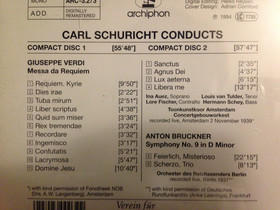Carl Adolph Schuricht (3 July 1880 – 7 January 1967) Schuricht was born in Danzig (Gdańsk), German Empire; his father's family had been respected organ-builders. His mother, Amanda Wusinowska, a widow soon after her marriage (Carl's father drowned saving a friend three weeks before he was born), brought up her son alone. His childhood was surrounded by music - "every Sunday in summer we used to hire three large open carriages and go out into the country. After the picnic we would join in singing choral works by Bach, Handel and Mendelssohn." He showed a talent for music at an early age, studying piano and violin from the age of six. By eleven he was composing, and continued his academic and musical studies when his mother moved to Berlin, then to Wiesbaden. At 20 he obtained the post of Korrepetitor at the Stadttheater in Mainz and two years later won the Kuczynski Foundation prize for composition and a Felix von Mendelssohn scholarship. He then returned to Berlin to study piano under Ernst Rudorff and composition with Engelbert Humperdinck, later working under Max Reger in Leipzig, publishing chamber pieces, sonatas and lieder. Attracted by the profession of conductor he undertook tours in Germany conducting operettas, operas, choral societies and symphony concerts. During this time he had the chance to watch at rehearsal and in concert such figures as Arthur Nikisch, Felix Weingartner, Ernst von Schuch, Felix Mottl, Hans Richter, Karl Muck and Gustav Mahler. In 1906 he heard Frederick Delius's Sea Drift in Essen with the composer present, and promised to Delius that when he had his own orchestra he would conduct it himself, which he did in Frankfurt with Delius again in the audience. In 1909 he succeeded Siegfried Ochs as director of the Rühlscher Oratorienverein in Frankfurt-am-Mein and at 31 was appointed musical director of the municipal orchestra in Wiesbaden; festivals of modern music (Richard Strauss, Reger, Mahler, Delius and Arnold Schoenberg) made Wiesbaden an internationally-renowned centre for music. Schuricht said of this time "The German public was no more avid than any other for the novelties which I wanted to give it. I have to prepare it for them gently, convince without bludgeoning, cajole and seduce. I managed this by prefacing concerts of modern music by lectures, which I illustrated with extracts played by myself at the piano or by the orchestra." His career was not that of a star but he was loved both by the orchestra members and audience. As music director at Wiesbaden (1923-1944) he conducted performances of Mahler's symphonies, although they were not as popular at the time as they are now and were eventually banned under the Nazis because of the composer's Jewish background. Schuricht continued to conduct Mahler outside Germany. In October 1939, during the Phoney War, a performance of his with the Amsterdam Concertgebouw Orchestra of Mahler's Das Lied von der Erde was disrupted by a woman heckler who called out "Deutschland über alles, Herr Schuricht". Schuricht worked at the Hague/Scheveningen Festival from 1930-39 and was guest conductor with the Dresden Philharmonic from 1942 to 1944. He was expected to take over as director of the orchestra from 1 October 1944, but escalation of the war meant that the orchestra was closed down and Schuricht himself received a warning that he was about to be arrested, and he fled to Switzerland. He settled in Zürich where he married Maria Martha Banz and worked with l'Orchestre de la Suisse Romande. During the late 1940s and 1950s Schuricht conducted throughout Switzerland, at the re-opening of the Salzburg Festival in 1946, in Paris, and at the festivals of Holland, Lucerne, Aix-en-Provence and Montreux. He regularly conducted the South German Radio Symphony Orchestra from 1950 to 1966. When the Vienna Philharmonic made their first tour to the USA in 1956, Schuricht replaced Erich Kleiber, sharing the conducting during the six weeks with André Cluytens. He died at the age of 86 in his home at Corseaux-sur-Vevey, Switzerland, and was buried in Wiesbaden, as an honorary citizen of that city. ***************************** 
Giuseppe Verdi
Messa da Requiem 1. Introit and Kyrie
2. Dies irae
Dies irae
Tuba mirum
Mors stupebit
Liber scriptus
Quid sum miser
Rex tremendae
Recordare
Ingemisco
Confutatis
Lacrymosa
3. Offertory
Domine Jesu Christe
Hostias
4. Sanctus
5. Agnus Dei
6. Lux aeterna
7. Libera me
Libera me
Dies irae
Requiem aeternam
Libera me Ina Souez, soprano Lore Fischer, contralto Louis van Tulder, tenor Hermann Schey, bass Toonkunstkoor Amsterdam Concertgebouworkest Carl Schuricht 2.11.1939 (live in Amsterdam) 
*****************************
Запись из личной коллекции | 
